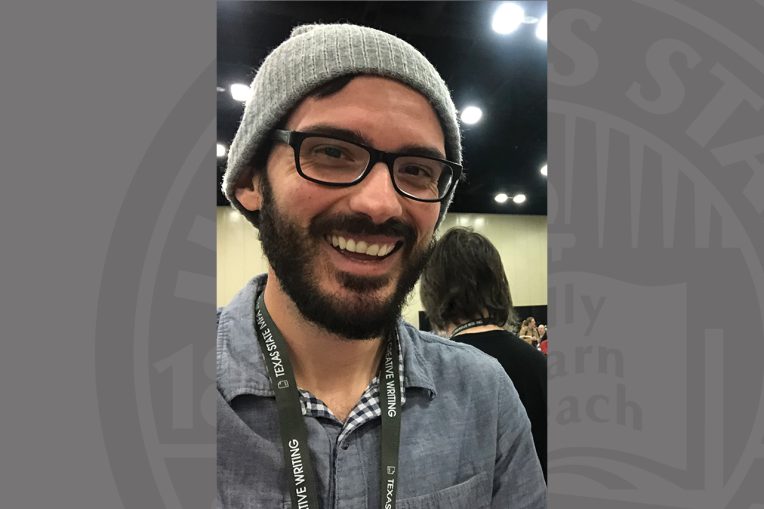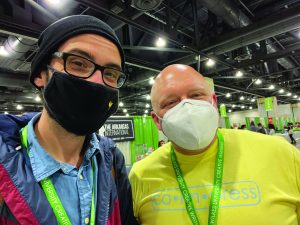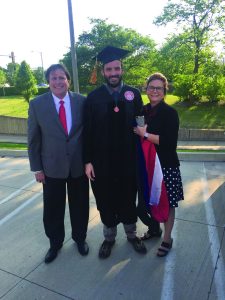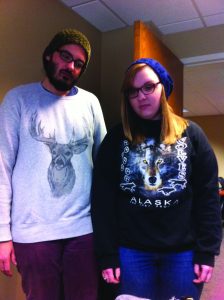Mike Shier, Ph.D. ’17, graduated from Illinois State University with a doctorate in English studies: creative writing. During his time at Illinois State, he worked as a graduate teaching assistant and an instructional assistant professor for various courses in the English Department, and he served as a production intern for the Publications Unit. His chapbook, Escapology / The Gun That Won the West, was published in fall 2016 by PRESS 254, the Publications Unit’s teaching chapbook press.
He currently works in multiple publishing-centered roles at the University of Central Florida. He is the managing editor of The Florida Review and the publications coordinator/research specialist at the Center for Humanities and Digital Research, and he serves as core faculty in the texts and technology graduate program. We had a chance to talk with Dr. Shier about his time and experiences at Illinois State, how he got into the publishing field/industry, his current positions, and advice for those interested in a career in publishing.
You completed your bachelor’s and master’s degrees at different universities in Florida and then came to central Illinois to complete your doctorate in English studies: creative writing at Illinois State University. What made you decide to come to Illinois State to further your education in English studies?
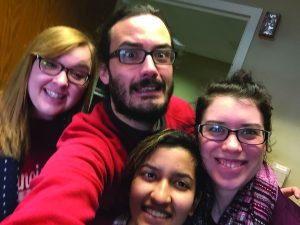
Choosing a Ph.D. program is a really specific process—when I was applying, I was insistent on continuing my education in creative writing, specifically in the creative nonfiction genre. At the time, I only remember there being maybe 10 programs in the U.S. that even allowed students to specialize in creative nonfiction, and ISU was one of them. ISU of course distinguished itself from all the other programs by being an English studies department rather than a typical English department, and I liked the idea of understanding my particular area of English studies as situated in conversation with other English disciplines. The other factor is who I wanted to work with in the faculty, and for me that was Kass Fleisher, who ultimately chaired my dissertation committee.
While at ISU, you were both an instructor and served as a graduate assistant at the Publications Unit. How did these experiences influence you and your postgraduation career trajectory?
I mean this not as hyperbole, but my time at the Publications Unit has probably shaped the trajectory of my academic career more than anything else. It is true I taught at ISU, primarily teaching business writing classes in addition to composition and creative writing courses. But I had also taught those things during my M.F.A. program, so while at ISU I had the benefit of genre studies, CHAT, and new pedagogical approaches, it was still teaching. The Publications Unit is where I learned pretty much every part of the technical process of publishing: from raw manuscript to printed and bound book with ISBN. It’s truly valuable “insider information” that many places simply never teach anyone. Then on top of that to get practical experience and finish my first semester with an actual book in hand that I had typeset—that had my own name printed in it (mine was O’Hearn by Greg Mulcahy, a 2015 FC2 book )—really reinforced how tangible these skills are. These skills were always situated in conversations about publishing as a field during our roundtable meetings and assigned readings, too. When a job opened up at UCF to work in journal publishing and be assigned Ph.D. student interns, it seemed I had already experienced the blueprint for such a position.
What are some of the skills you cultivated throughout your time at the Publications Unit and the Department of English at Illinois State and are there any ways those foundational skills support your current professional publishing work?
The publishing knowledge—not just industry and process information, but also specific technical knowledge like how to use InDesign and Photoshop—has shaped my current professional work in almost every way. There are the obvious ways in which these things in a 1:1 way lead to my process working with graduate students on the annual chapbook put out by The Florida Review, but further affect publications like the James Joyce Literary Supplement and the Journal of Themed Experience and Attractions Studies that are published totally digitally but still typeset in InDesign for a print layout by graduate students here. I am not situated in a publications unit here but rather am part of a digital humanities center (Center for Humanities and Digital Research, or CHDR as we call it), and we’ve made a case for the dissemination and publication of work, whether print or digital, being an integral part of digital humanities. After all, even if the book is printed, the work on it is completed digitally. This would not be a perspective I could have loaned to CHDR without my time in ISU’s Publications Unit.
Can you explain more about the process of publishing with PRESS 254, the teaching chapbook imprint at the Publications Unit? Did you face any difficulties or was there anything that surprised you?
The process of publishing with PRESS 254 is probably the most idealized form of publishing from a writer’s point of view. I was fortunate enough to be solicited, which is a great starting point. In my case, two essays were published, so each got their own cover: one where Steve Halle got to show off his skills and another where a student had an opportunity to design a cover. Getting published in this way was great, but knowing it was also providing a learning opportunity was the icing on the cake. And indeed students worked on the entire enterprise. I particularly liked seeing everyone sew the covers to the pages they had typeset! Not only does PRESS 254 celebrate writers, but it also provides tremendous practical experience for students. It was the most no-stress event for me, and I remember it fondly.
You serve in a number of roles including managing editor for a scholarly journal and a literary journal, publications coordinator at the Center for Humanities and Digital Research, and core faculty in the texts and technology program. Can you describe your typical workday managing these different roles?
You are astute to notice that my responsibilities here do cause me to bounce around a lot. Some days it can feel chaotic, but I find it truly valuable that I can move around and shift my focus through the day to keep things interesting. In my role as managing editor, for The Florida Review for instance, there are times when I have to work with the printer to establish pricing and print runs for our forthcoming issue, work with the editor and typesetter to refine the files for said issue, or send out orders that we receive for back issues. I am also a genre editor for that journal, so I may also read creative nonfiction submissions and choose work for publication if we are earlier in the timeline, or choose finalists and winners for our Editor’s Award in Creative Nonfiction during the summer. It depends on the day but there’s always something to do with editorial work. In CHDR, where I serve as the publications coordinator and research specialist, I will often contribute to work on digital humanities projects that we all work on in various ways (often, due to my experiences, this might look like building websites, doing design work, or applying programs in Adobe Creative Cloud to help with streamlining projects), or I’ll work on some of our new digitization equipment like the massive large format scanner we just acquired, the DT Titan from Digital Transitions, through an NEH-funded grant I was co-PI on. Then I have responsibilities through the texts and technology program, which provides me with graduate research associates (six this semester!) not unlike the interns at Illinois State’s Publications Unit. They work on everything I’ve just mentioned, too, either on publications or DH projects, or learning the digitization equipment we have on offer. The idea is they can eventually leave CHDR with expertise in these areas and distinguish themselves on the job market. Furthermore, as T&T is similar to any other academic unit, I have committee responsibilities (this year I worked on assessment) and serve on student exam and dissertation committees, as well.
Did you face any difficulties when transitioning from a student to a professional position?
The transition from student to professional wasn’t that difficult for me, just because after my M.F.A. I had already spent an entire year as a university instructor before starting a Ph.D. program. However, I will say that once I found myself in this particular position—responsible for the education and work hours of graduate research associates in their own Ph.D. program—I had a brief period of panic. Did I know the things I knew well enough to adequately train people? Luckily, thanks to the Publications Unit at ISU, I really did know those things well enough. But self-doubt exists for everyone.
Based on the numerous positions that you have held in the field of publishing and the skills that you have acquired along the way, what would you say are the most desirable traits or qualifications for students coming out of a degree program in publishing studies?
Now that I have been involved with so many things from the editorial side, I think I do have some perspective on what might be valuable for someone graduating with a degree in publishing studies or anyone who wants to work in the industry at all. Explicit qualifications are simple—know how to use InDesign for print publications, be familiar with web publishing (just knowing some HTML/CSS, how to use WordPress, or even some more bespoke publishing platforms like bepress), and have some knowledge of the tools of the trade in general (Where do ISBNs come from and what are they for? ISSNs?). These may seem basic but they really aren’t. They’re rare skills and knowledges. Hone them if you can.
How have your long-term goals changed as you have taken on new positions within publishing?
My long-term goals haven’t changed that much, surprisingly. At least not for myself. I do, long-term, want to set up more consistent workflows for the graduate students in the Center for Humanities and Digital Research to be involved with the journals here at UCF. Production schedules and different platforms mean it can be a long time between issues, so InDesign skills may fall off by the time another print project comes around because they’ve been working on one of our digital journals in the meantime. To that end I do have some proposals in the works for some projects to be more consistently printed, but I don’t think I can talk about them yet.
What advice do you have for current students searching for publishing jobs and preparing for the job market?
If students are preparing for the job market with a degree in publishing studies, they will do best to understand the industry is in a state of crisis and reconfiguration. This is not to scare anyone off, though. On the contrary, I think this is a great time to find opportunities and distinguish yourself in the publishing industry. You need to be flexible, while also understanding that most jobs will require a knowledge of the full pipeline (editing, designing, publishing, printing, distribution) because depending on the size of the operation, it may be one person doing everything rather than having one specialized person for each role. Or with small press publishing and micro presses, publishing can look like anything and be something you engage with professionally or as a hobbyist in addition to a main job. But the skills you have as a publishing studies major are so remarkably transferable to other fields (graphic design, web design, content management) that as long as you know the things you’ve studied, there is a place for your skills out there.
About the authors: Georgeanne Drajin, Jessica Kreul, and Kyu Kyu Thein are undergraduate students at Illinois State University. They are all majoring in publishing studies in the Department of English and serving as production interns at the Publications Unit. When they are not working, Thein can be found listening to 90s power ballads, Drajin can be found reading with a cup of coffee, and Kreul can be found watching TV.
You can find additional information about the publishing studies sequence and internship and assistantship student opportunities at the Publications Unit website or contacting Steve Halle, director of the Publications Unit, at cshalle@IllinoisState.edu or (309) 438-7481. Follow the Publications Unit on X @PubUnit_ISU and on Instagram @PubUnit.
